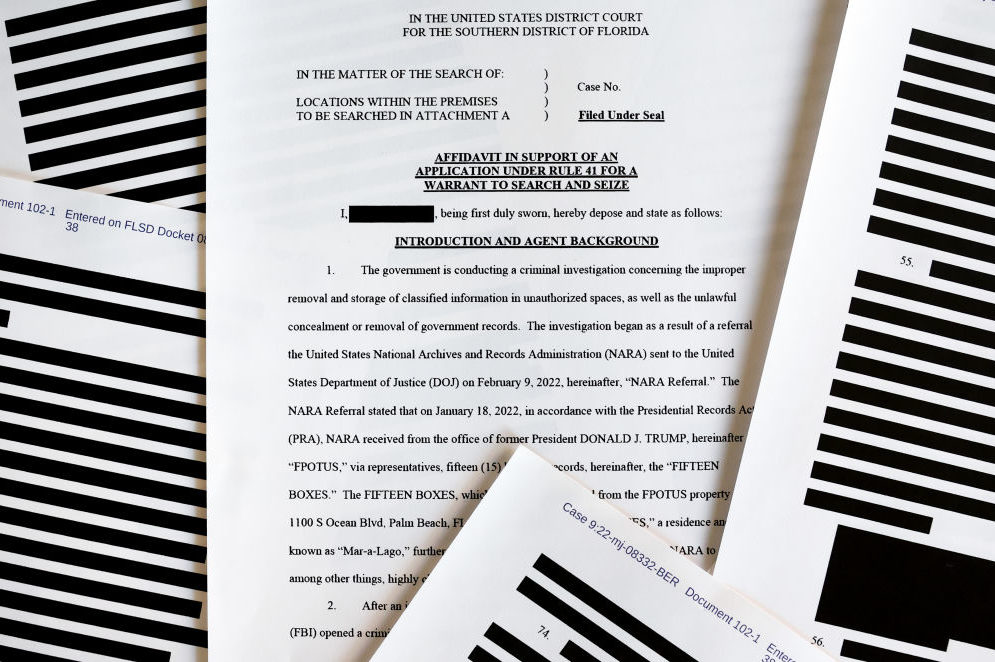Republicans refocus after Mar-a-Lago distraction
Three weeks have passed since fifteen boxes of documents were seized by the FBI at Mar-a-Lago. The breathless reporting about the unprecedented search has faded into the kind of Trump-criminal-investigation white noise with which Americans have lived with for half a decade now, and Republican defenses of the former president are far less enthusiastic than they were immediately after the sweep.
As the New York Times observes, the former president’s most loyal defenders paid notably little attention to Friday’s publication of a heavily redacted affidavit that revealed more details about what was taken from Trump’s residence and why. Overblown calls to “defund the FBI” and lamentations that America is now a banana republic are a lot harder to come by today than they were just a few weeks ago.
To some, this is simply a sign that the former president is, legally speaking, in hot water: according to this argument, the lack of an especially vociferous defense of Trump is evidence of the indefensibility of his actions. That view, I tentatively suggest, rests on some rather naive assumptions about contemporary American politics and its protagonists’ willingness to defend the indefensible.
No, a far simpler explanation is that Republicans of all stripes can read polls. They know that a preoccupation with Trump and the FBI raid coincided with an apparent deterioration in their standing in the eyes of voters. The country may not be up in arms about the former president’s treatment of classified documents, but the raid shifted focus from the Biden administration. Republicans appreciate that they maximize their chances of success in November by making Senate and House races as much about the unpopular occupant of the White House as they can.
Notwithstanding an initial outburst of solidarity, Republican actions are confounding predictions that the Mar-a-Lago raid would turn Trump into a cause célèbre on the right, reassert his power over his party and all but hand him the 2024 nomination. So far, that has not proved to be the case.
Nothing about the politics of the investigation into Trump is fixed, however. And things could change quickly if, for example, the Justice Department escalates things by charging the former president. For now, Republicans seem to have been chastened into more disciplined messaging than many predicted three weeks ago.
*** Sign up to receive the DC Diary in your inbox here ***
The limits of monetary policy
The wary tone struck by Jay Powell in his speech to the Jackson Hole gathering of central bankers spooked markets on Friday. A paper delivered at the same conference the next day sent an awkward but important message to the White House and Congress.
The papers authors, Leonardo Melosi of the Chicago Federal Reserve and Francesco Bianchi of Johns Hopkins University, argue that there are limits to the Fed’s ability to curb inflation when the cause of that inflation is fiscal. “The fact that approximately half of the recent increase in inflation has fiscal roots poses some specific challenges for policymakers today,” they write. “When inflation has a fiscal nature, monetary policy alone may not provide an effective response” and “the central bank is not uniquely responsible for its reduction.”
For much of his presidency, Biden has responded to questions about inflation by emphasizing the importance of central-bank independence: a subtle yet unconvincing bit of buck-passing. The inflation-busting branding of the recent reconciliation bill may have been an acknowledgment of that Biden needed to be seen to do more to fight inflation. But the insincerity of that packaging was exposed when it was swiftly followed by college debt forgiveness. But the warning from Jackson Hole could hardly have been clearer: the fight against inflation is far from over, and it cannot be waged with monetary policy alone.
A high-profile victim of Washington’s crime wave
In the latest incident to spotlight the worsening problem of violent crime in the capital, Washington Commanders rookie running back Brian Robinson Jr., was shot multiple times in what police say was an attempted carjacking or armed robbery on H Street NE yesterday. Robinson is in a stable condition and the injuries are not life-threatening. With violent crime is on the rise in DC, and carjackings increasing at an especially fast rate, this attack is a high-profile instance of an all-too-everyday crime.
What you should be reading today
Bruce Bawer: Is the right backsliding on gay rights?
Ben Domenech: Shane Gillis is going places
Teresa Mull: Does ‘BDE’ mean that masculinity isn’t toxic anymore?
Joseph C. Sternberg, Wall Street Journal: How the Ukraine war is transforming Germany
Paul Kane, Washington Post: Alums of 2010, 2018 urge midterm caution
Yuval Levin, National Review: Republicans need an agenda
Poll watch
President Biden job approval
Approve: 41.9 percent
Disapprove: 54.6 percent
Net approval: -12.7 (RCP Average)
Wisconsin Senate race
Ron Johnson (R): 47 percent
Mandela Barnes (D): 49 percent (Trafalgar)


















